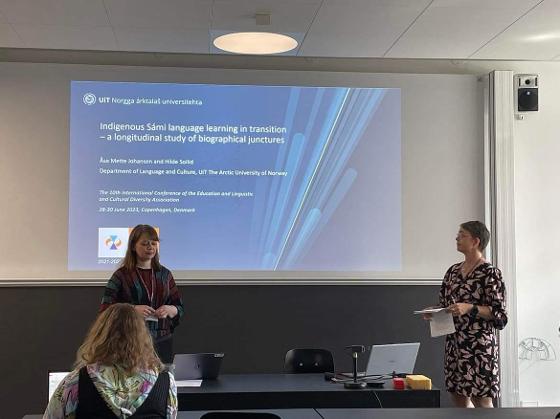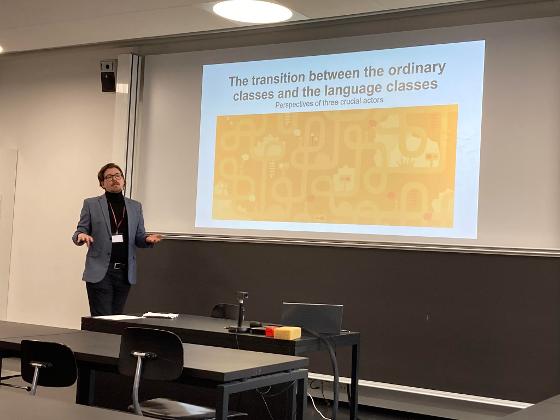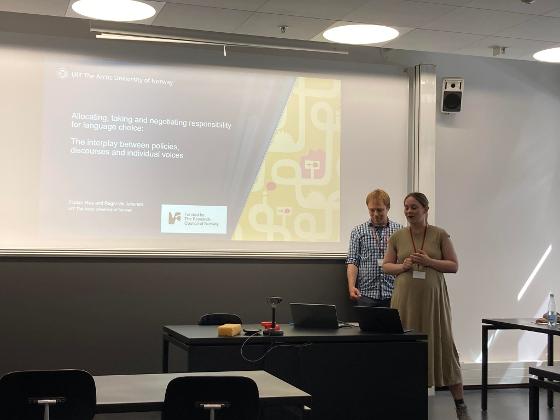June 2023: MultiTrans at EDiLiC, University of Copenhagen
MultiTrans participated in the 10th International Conference of the Association EDiLiC. From Early Childhood to Adulthood: Transitions, Continuity and Disruptions in Plurilingual Education, arranged at the University of Copenhagen, Department of English, Germanic and Romance Studies between 28 and 30 June 2023.
The whole MultiTrans group participated in the 10th International Conference of the Association EDiLiC. From Early Childhood to Adulthood: Transitions, Continuity and Disruptions in Plurilingual Education, arranged at the University of Copenhagen, Department of English, Germanic and Romance Studies between 28 and 30 June 2023.
The Association EDiLiC aims to contribute to the dissemination and discussion of knowledge developed in the field of education and linguistic and cultural diversity. The conference enables dialogue between those engaged in research and practice in plurilingual and pluricultural education as well as content and Language integrated Learning. Both vertical transitions throughout the education system and horizontal transition in terms of non-formal and formal contexts or integration of home-languages are in focus in the conference.
MultiTrans participated with three presentations:
1) Åse Mette Johansen and Hilde Sollid: Indigenous Sámi language learning in transition – a study of longitudinal biographical junctures. The presentation explores how two students of Sámi as a second language explore disruptions and continuities in their language learning trajectories in the transition from lower to upper secondary school. The presentation discussed the meaning of place and time in the narratives of the students, and the role of different factors in the students’ perspectives on their own Sámi language learning projects, for instance belonging to place, family or Sámi communities as well as prior experiences and ideas about the future.

2) Lukas Kosner: To choose a bubble? The transition between primary to lower secondary education for pupils having Kven/Finnish/Northern Sámi as a second language. The presentation focused on transitions between regular classes and classes of Kven and Northern Sámi as a second language from the perspectives of students and teachers. The presentation discussed tensions and space for negotiation in these transitions, especially connected to the experience of being taken or having to take out students from regular classes. It also pointed to discourses positioning regular subjects in different ways which again has influence on the teachers’ choices of taking out students and on the students’ space for negotiation.

3) Ragni Vik Johnsen and Florian Hiss: Allocating, taking and negotiating responsibility for language choice: The interplay between policies, discourses and individual voices. The presentation explored the question of how responsibility for Sámi language learning is constructed in discourses about Sámi language education in news media and individual voices of students in lower secondary school. It pointed to how responsibility prevails in public discourses and how different voices allocate these responsibilities to different actors and institution. Furthermore, responsibility is also reflected in the students’ voices, connected to their plans for future studies and job opportunities, for family reasons, for instance being able to speak Sámi with their own or their relatives’ children to help them to learn the language, as well as for the Sámi minority’s prosperity. This shows how responsibility involves different temporal horizons and raises the question of what consequences a perception of such responsibilities has for individual learners and their agencies and how the discourses of responsibility is constructed with regard to transnational multilingual students.

While each presentation advances knowledge on language teaching and learning across various educational contexts in Northern Norway, they share theoretical and methodological approaches. That is, the studies reported on in these presentations demonstrate the relevance of nexus analysis in analyzing the interplay between individual practices (the “historical body”) and broader, societal discourses (“discourses in place”). This is achieved through the employment of a number of ethnographic oriented methods of data generation, including fieldwork engagement, participant observation, and interviews. Participating at EDiLiC has been an enriching experience for our team, not only because of what we learned from the presentations on plurilingual education across Europe, but also because of the generative discussions that followed each of our presentations.